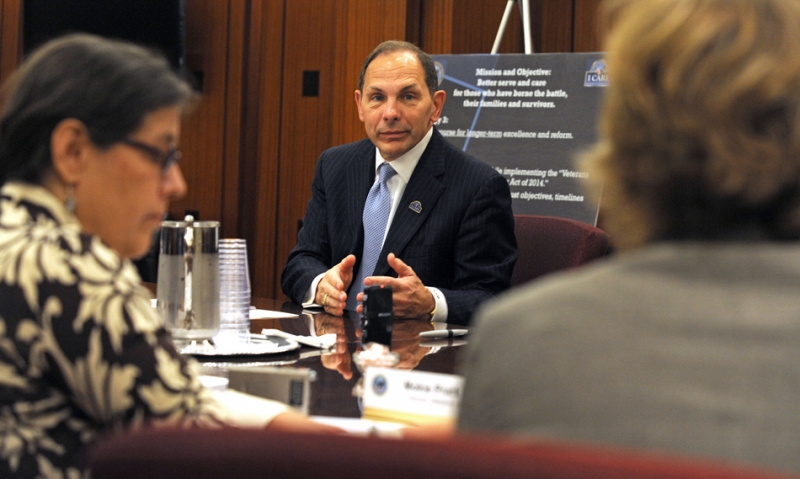
VA Secretary focuses on access and accountability at a recent briefing.
Department of Veterans Affairs Secretary Robert McDonald said at a Nov. 5 meeting in Washington that VA has "great people;" it is just a matter of "unleashing them."
“I think (VA workers) have felt somewhat to be prisoners of a system that they couldn’t change," McDonald said. "So I’m convinced we’re going to come out of this process stronger and better than ever before.”
McDonald reported on VA’s progress in complying with Congress-mandated reforms at a media roundtable attended by representatives from The American Legion and several other veterans service organizations. The Veterans Access, Choice and Accountability Act, signed into law by President Obama on Aug. 7, calls for increasing the accountability of senior VA executives for any wrongdoing, and improving timely access to VA health care for America’s veterans.
On the accountability issue, McDonald said VA has thus far proposed disciplinary actions against 41 of its executives. About 100 investigations of VA employees are being conducted by the Department of Justice and the FBI.
James Talton, former director of VA’s Central Alabama Health Care System, was fired last month after neglect-of-duty allegations were confirmed. McDonald said he wants all the proposed disciplinary actions to be just as successful. “But for me, what’s important is making sure the end result is the separation of the person (from VA employment). So speed is important but thoroughness and the ability for that proposal to stick is really what’s important.”
The five-day notice given to VA executives selected for firing or other administrative action is necessary, McDonald said, to ensure that due process is being followed. After consulting several legal scholars, VA determined the five-day notice would strengthen any cases that were appealed.
“I guess it comes down to this,” McDonald said. “The most important thing to me is that what I do sticks, right? So I don’t want to take any shortcuts, I don’t want to save five days and then lose the case.
“The problem with the critics is they’re all about the here and now. But what’s going to happen six months from now, when these cases get adjudicated? I need to make sure these stick, because I don’t want these people being forced back into our organization because we didn’t follow the right legal process. So that’s why we have an army of attorneys helping us with this.”
Withdrawing benefits from VA retirees as punishment for previous wrongdoing is not an option, McDonald said. “If you talk to any attorney who knows constitutional law, they will tell you that is impossible. If a person earns a retirement benefit over their career, you cannot claw it back based on disciplinary action. The law is quite clear about this. The person would have to commit treason, or something like treason, for the government to be able to claw back the retirement benefit.”
Addressing the issue of increased access to VA health care, McDonald said the new Veterans Choice Card, which provides access to private-sector medical care, is being mailed to veterans in three increments, starting with a Nov. 5 mailing to veterans who live more than 40 miles from a VA facility. The second mailing will go to veterans who have waited longer than 30 days for VA medical care, and the third will be sent to the remaining veterans by January.
According to a June 2014 report by the Congressional Research Service, about 6.5 million veterans received VA health care in fiscal 2013; about 9 million are enrolled in the system.
McDonald said wait-times for VA primary care nationwide have gone down by 18 percent since May, “and in many spots of the country, there is virtually no wait-time….We’ve extended clinic hours at most of our facilities, we’ve used mobile clinics to move from site to site where the need is greatest, we’ve had people work on the weekends, we’ve reached out and called people -- we’ve called over 311,000 veterans.”
The use of non-VA medical care has risen since last year by 47 percent for a total of 1.1 million authorizations, McDonald reported, “all of which is designed to accelerate care.
“We’ve got to take responsibility for the quality of that care, and that is a big, big issue…. In a sense, we go from being a health-care system to almost as if we’re an insurance company, because we’re helping people get outside care that we’ve got to take responsibility for. So that’s a big challenge.”
At his first press conference about three months ago, McDonald gave out his cell phone number. Since then, he has received about 900 phone calls or text messages and “we probably have solved about 25 to 30 percent of (the issues). The responses I get from the veterans, where we’ve solved their issue, are quite fulfilling. But the point is, we’ve got to design this organization so it doesn’t depend on my cell phone.”
- Veterans Benefits

